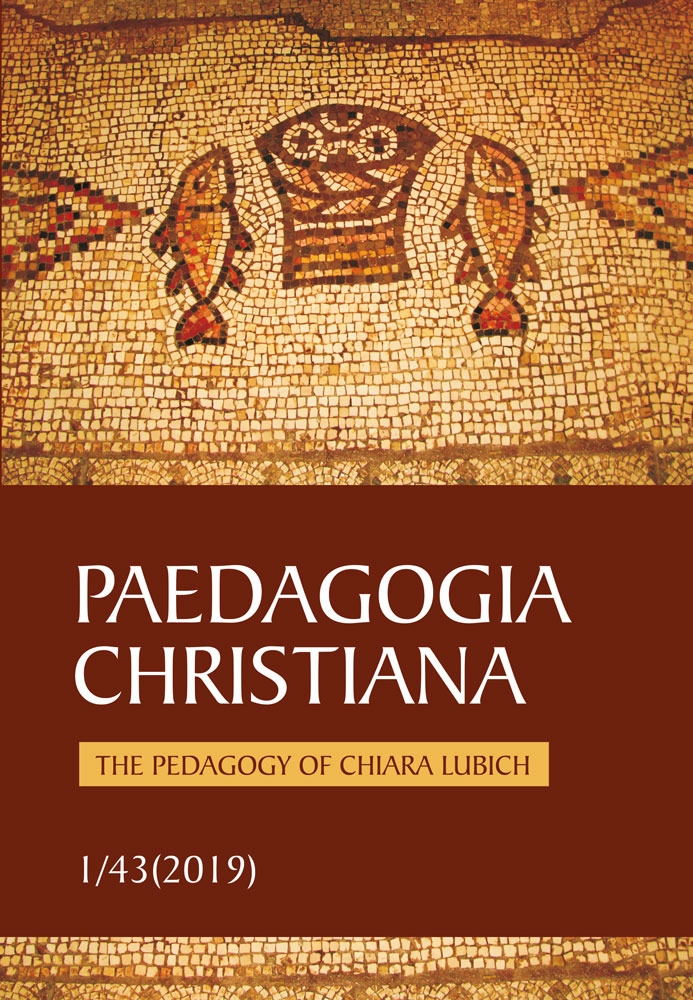The Teacher as a Model of Life and Thought
DOI:
https://doi.org/10.12775/PCh.2019.008Keywords
educator, model, knowledge, thought, serviceAbstract
The present article focuses on pedagogical aspects emerging from Chiara Lubich’s written work and oral conversations. Here, three major points are elaborated: the importance of the relationship as a fundamental element of education; the importance of the educational model, conceptualised as the need of an Ideal Teacher source of life inspiration; the concept of thought and knowledge as a service of love to the world. Points of conversation were fostered within the framework of these aspects to develop a model upon which education, thought and action are built as means of fraternal service.
References
Anzelm z Aosty. „Proslogion”, tłum. Leszek Kuczyński. Przegląd Tomistyczny 3 (1987): 179–216.
Blaumeiser, Hubertus. „Un mediatore che è Nullaˮ. Nuova Umanità, 3–4 (1998): 385–407.
Chiampi, Donato. „La maestra Silvia non aveva la matita rossaˮ. DVD – Wywiad z jej uczniami. W: Essere educatori, coraggio di una presenza (Być wychowawcą, odwaga obecności), red. Michele De Beni. Roma: Città Nuova, 2014.
Coda, Piero. „Alcune riflessioni sul conoscere teologico”. Nuova Umanità 122 (1999): 191–206.
Conferenza Episcopale Italiana. Orientamenti Pastorali. Educare alla vita buona del Vangelo. Milano: Edizioni S. Paolo, 2010.
Debesse, Maurice, Gaston Mialaret. Trattato delle scienze pedagogiche, t. 1. Roma: Editore Armando, 1971.
De Bono, Edward. Io ho ragione, tu hai torto. Milano: Sperling e Kupfer, 1990.
Groppo, Giuseppe. „Teologia dell’educazione”. W: Enciclopedia pedagogica, t. VI, 11787–11798. Brescia: Editrice La Scuola, 1994.
Guardini, Romano. Persona e libertà. Brescia: Editrice La Scuola, 1987.
Husserl, Edmund. Idea fenomenologii, tłum. Janusz Sidorek. Warszawa: PWN, 2014.
Kant, Immanuel. Krytyka praktycznego rozumu, tłum. Benedykt Bornstein. Kęty: ANTYK, 2002.
Klemens Aleksandryjski. Wychowawca, tłum. Marian Szarmach. Toruń: Wydawnictwo Naukowe Uniwersytetu Mikołaja Kopernika, 2012.
La Trinità e il pensare, red. Piero Coda, Andreas Tapken. Roma: Città Nuova, 1997.
Lévinas, Emmanuel. O Bogu, który nawiedza myśl, tłum. Małgorzata Kowalska. Kraków: Znak, 1994.
Lipman, Matthew. Educare al pensiero. Milano: Editrice Vita e Pensiero, 2000.
Lubich, Chiara. Charyzmat jedności, red. Michele Vandeleene. Kraków: Fundacja Mariapoli, Wydawnictwo M, 2007.
Lubich, Chiara. „Gesù Maestro”. Nuova Umanità 6 (2008): 607–612.
Lubich, Chiara. „Mistero d’amore”. Gen 18 (1984): 3.
MacIntyre, Alasdair. Dziedzictwo cnoty. Studium z teorii moralności, tłum. Adam Chmielewski. Warszawa: PWN, 1996.
Morin, Edgar. I setti saperi necessari all’uomo futuro. Milano: Edizioni Cortina, 2001.
Mortari, Luigina. Epistemologia della ricerca pedagogica. Verona: Editrice Universitaria, 2003.
Nanni, Carlo. L’educazione tra crisi e ricerca di senso. Roma: Libreria Ateneo Salesiano, 1986.
Quando la scuola educa, red. Michele De Beni. Roma: Città Nuova, 2017.
Paweł VI. Adhortacja Evangelii Nuntiandi. Watykan: Libreria Editrice Vaticana, 1975.
Povilus, Judith. Gesù in mezzo nel pensiero di Chiara Lubich. Roma: Città Nuova, 1981.
Scilironi, Carlo. In cammino verso l’uomo. Milano: Edizioni S. Paolo, 1994.
Suchodolski, Bodgan. Pedagogia dell’essenza e pedagogia dell’esistenza. Roma: Editore Armando, 1965.
Zambrano, Maria. Chiari nel bosco. Milano: Editrice Feltrinelli, 1991.
Downloads
Published
How to Cite
Issue
Section
Stats
Number of views and downloads: 526
Number of citations: 0



